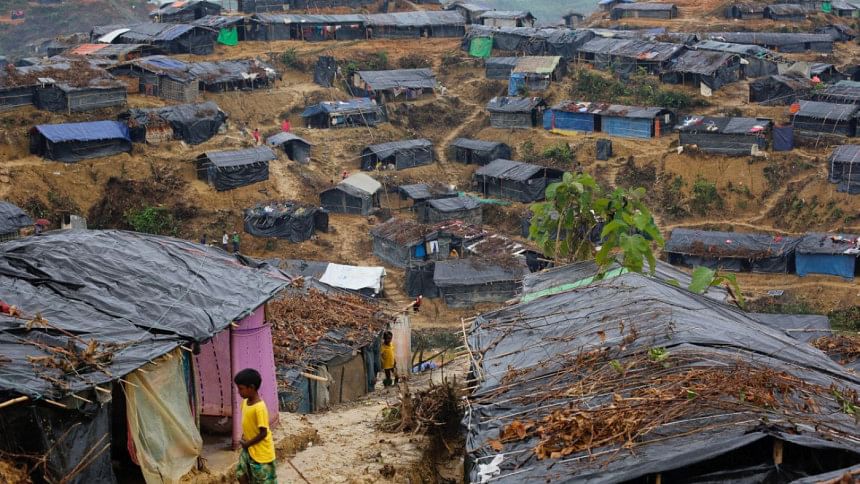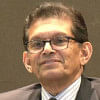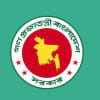World must speak up for Rohingyas

As I watched President Trump deliver his speech to the UN General Assembly in New York on the morning of September 19, I couldn't help but be dismayed by the fact that he did not consider the current round of ethnic cleansing carried out by the Myanmarese military rulers egregious enough to mention it even once during his speech. Trump did not fail to call North Korean President Kim Jong-un the "Rocket Man", single out the Iranian regime as "a corrupt dictatorship", or label the Venezuelan regime of Nicolás Maduro as a "socialist dictatorship"! This act of omission on the part of an American president to raise the brutal persecution of Rohingyas in Myanmar is a matter of great concern, not only for Bangladesh, but also for many other countries that have voiced their concerns over evicting hundreds of thousands of people from their homes on the basis of false allegations of religion and ethnicity. It is yet another example of the double standards that have bedevilled recent US foreign policy.
Last year, during a visit to Cox's Bazar, I, along with my family, visited the border area of Bangladesh and Burma near the Naf River. It was winter, the river crossings were nearly empty, and the entire area looked peaceful and scenic. Little did I imagine that this bucolic setting would be turned into a veritable killing field by the semi-autocratic rulers of Myanmar so soon. The excuse they offered to perpetrate this act of inhumanity is the attack by the militants of Arakan Rohingya Salvation Army (ARSA) on August 25. However, there can be no tolerable excuse to kill innocent human beings, torch their huts, drive children and women from their homes and imperilling their lives.
Myanmar until recently was shunned by the international community for its lack of democracy and the brutality unleashed by its former military rulers against their own people. However, the US and other governments relaxed the sanctions recently in response to the measures taken by the previous army junta. However, and ironically so, the new government formed by the National League for Democracy (NLD) party, led by State Counsellor Aung San Suu Kyi and President Htin Kyaw, has now reengaged in a slightly different variation of the strong-armed tactics it had used against its people for decades. For the Rohingyas, unfortunately, this latest round of oppression follows the same book as that of previous governments.
Myanmar has persecuted the Rohingyas for ages but more recently the technique has evolved and intensified. Earlier this year in February, Human Rights Watch (HRW), a New York-based organisation, in its report entitled "Burma: Events of 2016" mentioned that it was able to document instances where the government had resorted to using a familiar set of tools in a campaign of "ethnic cleansing" against the Rohingyas: rape, gang rape and other sexual violence against young girls. To quote, "The sexual violence did not appear to be random or opportunistic, but part of a coordinated and systematic attack against Rohingya, in part because of their ethnicity and religion."
It is sad that the current crisis comes at a bad time for both the refugees and Bangladesh. Rains during the months of August and September multiply the hardships for the destitute and vulnerable refugees. In recent weeks, we have seen hurricanes and storms in the western hemisphere, flooding in Bangladesh and the US, and earthquakes in Mexico. As a result, the plight of the Rohingyas is competing for world attention against victims of natural calamities, and vying for limited aid resources. I am not sure if that is the main reason why help and support from the international community has been so miserly! However, unlike the other cases, we must note that the cause of the Rohingyas has an urgency. Unlike the others affected by recent disasters, the Rohingyas cannot rebuild their lives without returning to their homestead in Myanmar. It is obvious that there is no possibility of normal existence should they be forced to stay in the cramped quarters of shelters for long periods of time. Conditions in the Rohingya refugee camps are akin to the internment camps inside Myanmar, and barring any hopes of returning to their abandoned, burned or destroyed homes, the Rohingya Diaspora cannot be expected to settle down peacefully in the crowded shelters without looking for outlets to vent their frustrations.
Fortunately, world attention has now gradually been turning to this issue. And Bangladesh should ask the international community to provide greater assistance for two reasons. First, even if we are a generous people, we have limited resources. Rohingyas, who have been characterised as one of the world's most persecuted minorities, and subjected to a campaign of marginalisation and dehumanisation, need a champion to advocate their case. Bangladesh, as a nation, faced similar conditions during our struggle against Pakistan, and we cannot turn our backs on the Rohingyas. In partnership with our allies, we should immediately exert pressure on the Myanmarese government to cease and desist, and we cannot shy away from leaning on the Nobel laureate Daw Aung San Suu Kyi to exercise her influence with the military and to stay away from the prevarications she has been resorting to lately in public.
UN High Commissioner for Human Rights Zeid Ra'ad al-Hussein said last Friday that Daw Suu Kyi had promised to investigate the UN's allegations. Nevertheless, at a press conference on September 19, she used subterfuges to avoid admitting any knowledge of the military operations against the Rohingyas, according to the BBC.
Some good news is also coming in. Professor Amartya Sen has offered to sign an open letter along with other Nobel laureates. The Secretary-General of the UN has reiterated al-Hussein's concerns in condemning the actions of the Myanmarese military as ethnic cleansing. It now appears that the tide of international opinion is finally turning. We need to act forcefully and the world needs to utter in unison to the powers that be in Myanmar that the situation is completely unacceptable, and that the world cannot simply stand by and watch.
Dr Abdullah Shibli is a Senior Research Fellow at International Sustainable Development Institute (ISDI), a think tank based in Boston, USA.










Comments